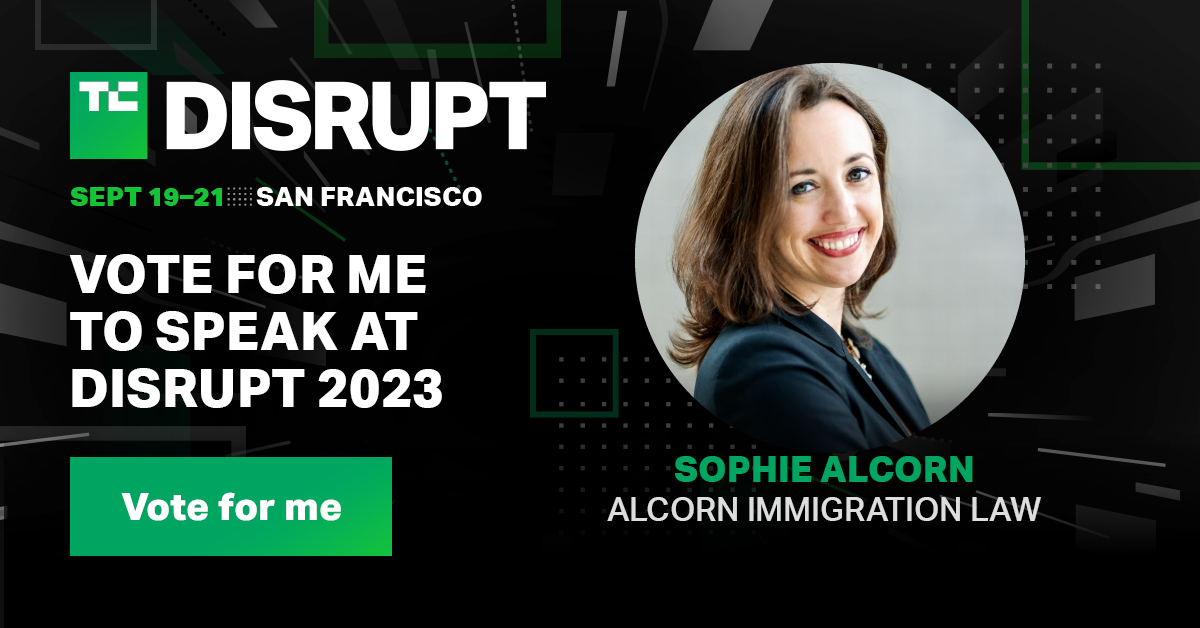Here’s another edition of “Ask Sophie,” the advice column that answers immigration-related questions about working at technology companies.
“Your questions are vital to the spread of knowledge that allows people all over the world to rise above borders and pursue their dreams,” says Sophie Alcorn, a Silicon Valley immigration attorney. “Whether you’re in people ops, a founder or seeking a job in Silicon Valley, I would love to answer your questions in my next column.”
TechCrunch+ members receive access to weekly “Ask Sophie” columns; use promo code ALCORN to purchase a one- or two-year subscription for 50% off.
Dear Sophie,
I founded a startup in Zimbabwe a few years ago. I planned to visit the United States for the first time next month to check out the market and applied for a visitor visa.
I’m planning to stay in the U.S. for a couple of months, but I just realized that my passport expires in September. I understand that I need to have at least six months left on my passport in order to travel to the United States.
Is that (still) true? Do I need to delay my trip?
— Hopeful in Harare
Dear Hopeful,
Thanks for reaching out to me with your questions! It’s so wonderfully exciting to hear about your plans to visit the United States for the first time. Let’s dive right in.
In general, yes, visitors who are traveling to the United States are required to have passports that are valid for at least six months after the date they arrive in the U.S. Many countries have this six-month passport validity requirement.
In the U.S., however, certain countries are exempt from the six-month requirement and citizens of those countries only need to have a passport that is valid through the date of their stay in the U.S. Citizens of Zimbabwe are exempt from the six-month rule, so as long as you leave the U.S. before your passport expires, you’re covered! You don’t need to delay your trip!
Last month, U.S. Customs and Border Protection (CBP), which is responsible for border security at U.S. airports and other ports of entry, issued an updated list of countries exempt from the six-month passport validity rule. Nearly 130 countries, including Haiti, Hong Kong, India, Israel, Mexico, Pakistan, Russia, Taiwan and Ukraine, are on that list. China is not exempt.
This six-month passport validity exemption only applies to visitors: Those on a B-1 business visitor, a B-2 tourist visitor visa, or those on ESTA (Electronic System for Travel Authorization), the U.S. Visa Waiver program. Unfortunately, citizens of Zimbabwe are ineligible for the ESTA program, which enables citizens of 40 countries to travel to the U.S. for business for stays of 90 days or less without first obtaining a visa.
Even though the B-1 business visitor visa and the B-2 tourist visa are typically issued together as a single B-1/B-2 visa, make sure you tell the CBP officer when you arrive in the U.S. that you intend to conduct business as allowed under the B-1.
I mention this and a few other situations in my podcast episode on immigration pitfalls that startup founders should avoid. Doing business while in visitor status can jeopardize your ability to live and work in the United States or to enter the U.S. in the future.
To answer your question, yes, you will need either a B-1 business visitor visa or ESTA (Electronic System for Travel Authorization) Visa Waiver Program if you are not a citizen of either Canada or Bermuda. Citizens of Canada and Bermuda do not need a visa to visit the U.S. for certain business visitor activities for less than 180 days.
It’s never too early to meet with an immigration attorney to discuss your long-term goals and immigration options. I recommend that international founders such as you and your husband talk with an immigration lawyer even before you make your first business-related trip to the United States.
Keep in mind: You cannot work or get paid in the U.S. while you are here on a B-1 visa, but some business activities are typically allowed, such as:
- Conducting research.
- Interviewing prospective employees.
- Negotiating a contract, such as a lease agreement or employment contract.
- Meeting with investors or customers or potential investors or customers.
- Consulting with business associates.
- Attending a scientific, educational, professional or business conference.
- Participating in short-term training.
- Networking.
For application info or to check if the U.S. embassy or consulate in your area is scheduling appointments for B-1/B-2 visitor visas and if so, the approximate wait time for appointments, go to the U.S. Department of State Visitor Visa page.
Like the B-1 business visitor visa, ESTA is not for the purpose of enabling an individual to perform work in the United States even if the activity is subject to an agreement with a client that is based outside the United States. ESTA only enables individuals to come to the United States to perform the same type of business activities allowed under the B-1 visa.
It’s never too early to meet with an immigration attorney to discuss your long-term goals and immigration options. I recommend that international founders like you talk with an immigration lawyer even before you make your first business-related trip to the United States.
Safe travels and all the best on your adventure!
— Sophie
Dear Sophie,
I failed to win in the last three H-1B lotteries, and my STEM OPT work authorization expires in June.
What options do I have at this point?
— Desperate in Davis
Dear Desperate,
This probably won’t reduce your feeling of loss, but you are not alone. U.S. Citizenship and Immigration Services (USCIS) received a record 780,884 registrations for this year’s H-1B lottery, a huge jump from the nearly 483,927 eligible registrations it received in last year’s lottery and significantly more than the 85,000 annual cap on H-1B specialty occupation visas.
I had a similar question a few months ago from a reader who — like you — wasn’t selected after a third try. Take a look at that column in which I talk in more detail about alternatives: Your employer can sponsor you for either an O-1A extraordinary ability visa or a concurrent cap-exempt H-1B visa.
Another option would be to continue your education on an F-1 student visa. If the university you attend offers it, you can work under Curricular Practical Training (CPT). Then you can work under Optional Practical Training (OPT), and if you qualify, a two-year STEM OPT extension.
According to USCIS, more than half of this year’s registrations were multiple entries by different employers for the same individual. While employers cannot register an individual more than once without being automatically rejected from the lottery, multiple employers can sponsor the same individual thereby increasing that individual’s chance of being selected in the lottery. What is not allowed, however, is for employer sponsors to work together knowing that registering the same individual will increase his/her chances of being selected. USCIS indicated it will refer those cases for investigation.
Moreover, USCIS selected only 14.6% of eligible H-1B registrations this year compared to 26.9% in 2022 and 43.8% in 2021, according to Stuart Anderson, executive director of the National Foundation for American Policy.
Stay positive! You’ve got this!
— Sophie
Have a question for Sophie? Ask it here. We reserve the right to edit your submission for clarity and/or space.
Sophie Alcorn, founder of Alcorn Immigration Law in Silicon Valley, CA, is an award-winning Certified Specialist Attorney in Immigration and Nationality Law by the State Bar Board of Legal Specialization. Sophie is passionate about transcending borders, expanding opportunity, and connecting the world by practicing compassionate, visionary, and expert immigration law. Connect with Sophie on LinkedIn and Twitter.
Sophie’s podcast, Immigration Law for Tech Startups, is available on all major platforms. If you’d like to be a guest, she’s accepting applications!

